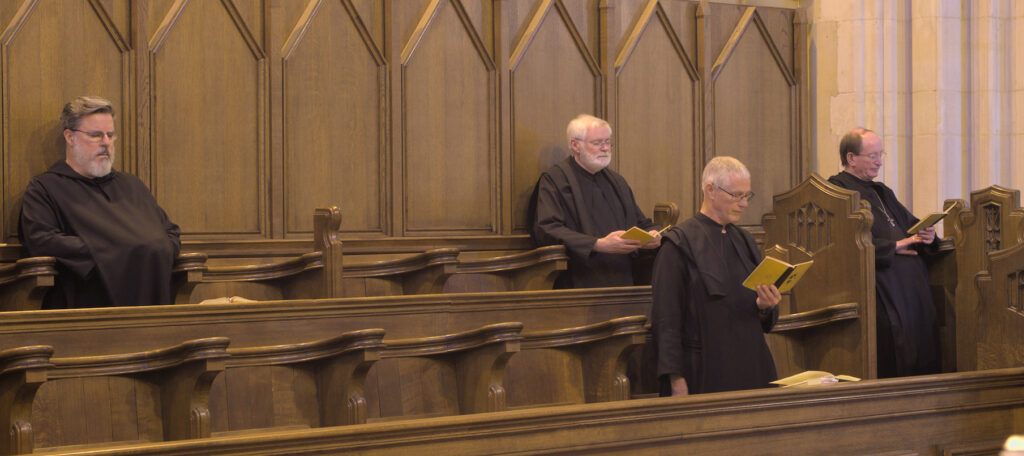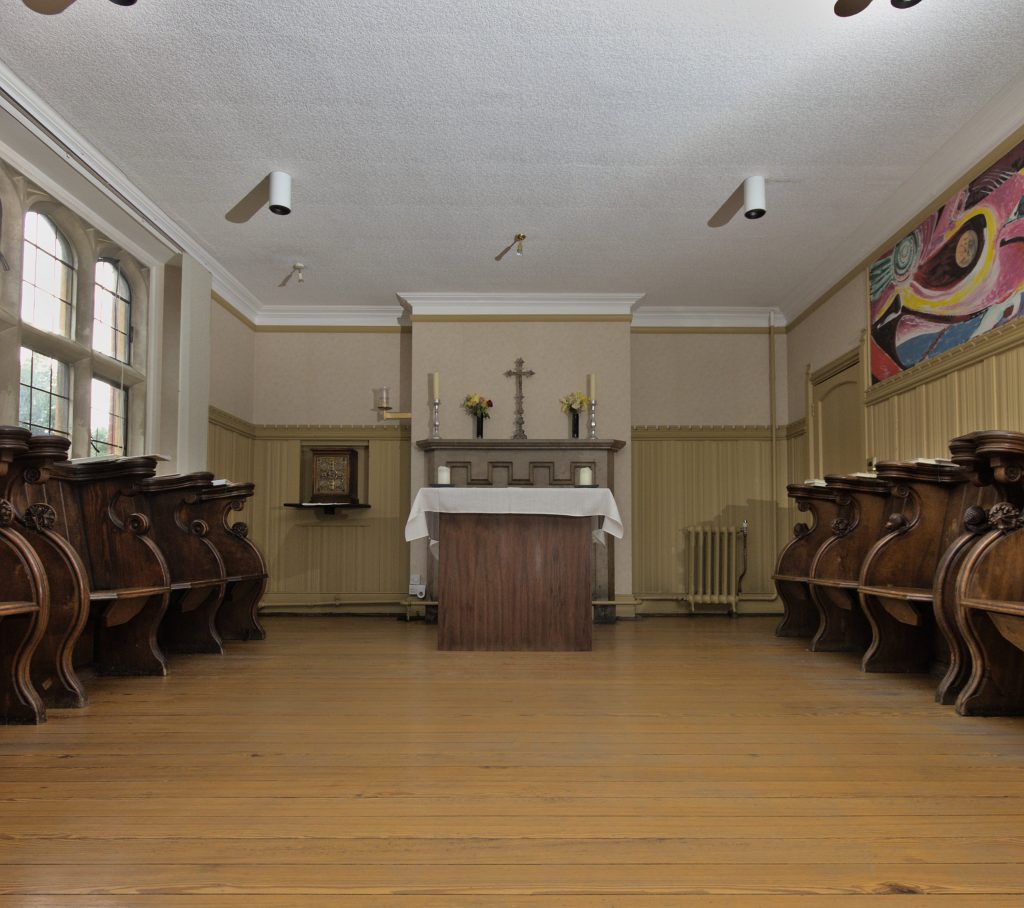The Divine Office, also called the Liturgy of the Hours, the Opus Dei or, in English, the Work of God, is the arrangement of psalms, Scripture, and prayer that monks and others use in order to pray constantly. St Paul urged the Thessalonians, ‘pray constantly’ (1 Th 5:17). Psalm 118 contains several references to prayer in the course of keeping God’s Law. The psalmist says, ‘At midnight I will rise and thank you’ (Ps 118:62). He also says, ‘ I rise before dawn and cry for help’ (Ps 118:147). Further on he says, ‘Seven times a day I praise you’ (Ps 118:164). This gives rise to the seven prayer sessions of the day.
At Ealing Abbey we pray the full Divine Office in common. The different parts of the Divine Office are described below. Generally, we pray Matins, Lauds, Vespers, and Compline in the Abbey Church, and the Little Hours of Terce, Sext, and None in our House Chapel.
All services in the Abbey Church can be seen on livestream.
The Ealing Abbey Horarium (timetable of prayer).
The Structure of the Hours
Each ‘Hour’ (the name for the different prayer times) has a similar structure. There is an Introduction, a hymn, some psalms, a reading from Scripture, and some prayers, followed by a Dismissal. Within that structure there is a lot of variation, which is why Little Hours last less than 10 minutes and Matins lasts about half an hour. Over the course of two weeks, we pray all 150 psalms, nearly 40 of them every week.
Starting the Office
The first Office of the day starts with an Invitatory. This is Matins, except for Sunday, when we start the day with Lauds, because we pray Vigils on Saturday evening.
The person leading the liturgy for the week, known as the Hebdom, says, ‘O Lord, open my lips’, and the monks reply, ‘And my mouth shall declare your praise’. All then say the Glory Be. The Hebdom then gives an antiphon, which the monks repeat, and then the Hebdom recites a psalm, with the monks repeating the antiphon at the end of each verse. As with all psalms, it ends with the Glory Be.
The rest of the Hours start with an Introductory. The Hebdom says, ‘O God, come to my assistance’, and the monks reply, ‘O Lord, make haste to help me’, followed by the Glory Be.
The Hours of the Divine Office
Matins
This is the first and longest of the liturgies. In the Roman Office it is called the Office of Readings. It starts with the Invitatory.
After the Invitatory, we sing a hymn. Hymns and psalms are usually sung with one side of the choir singing one verse, and the other side singing the next.
Following the hymn we chant one, two, or three psalms, depending on their length. Someone then reads a passage from Scripture. This is a bit longer than readings at Mass and is arranged so that over a two-year cycle we read most of the Bible. The only books not read are the Gospels and the Psalms – Gospels are read at Mass and the Psalms are the bulk of the Divine Office. After the reading there is silence for meditation on the reading. An important part of praying Scripture is silent meditation.
This is followed by another set of psalms and then a second reading. The second reading is not from the Bible. Instead, it is usually taken from one of the early Church Fathers, often a commentary on the passage of Scripture in the first reading. On saints’ days, the reading is either about the saint or from the saint’s writings. Again, the reading is followed by silent prayer.
After that we pray for anyone in the English Benedictine Congregation who has died recently and read a list of the monks and nuns whose anniversary is on that day. Then the Hebdom says the Collect for the day, followed by ‘Let us bless the Lord’, to which the monks reply, ‘Thanks be to God’.
Lauds
Lauds, or Morning Prayer, starts with the Introductory, as described above.
Next follows a hymn, appropriate to the day, saint or feast. After that we chant two or more psalms, a canticle (song) from the Old Testament, and another psalm, all ending with the Gory Be. Someone then reads a short passage of Scripture (usually two or three verses) from the breviary.
After a pause to meditate on what has been read there is a responsory. This is a line sung by the cantor and repeated as a response by the rest of the monks, followed by another line from the cantor and the monks repeating the second half of the response, and then the cantor sings, ‘Glory be to the Father and to the Son and to the Holy Spirit’ and the monks again repeat the response. Then we sing the Benedictus (Lk 1:68-79), also called the Gospel Canticle, ending with the Glory Be, after which the Hebdom reads the intercessions from the breviary.
Next the Abbot says, ‘Our Father’, and we all join in the prayer. Then the Hebdom reads the Collect for the day. After that he cantor sings, ‘Let us bless the Lord’ and the rest of the monks sing, ‘Thanks be to God’. Then the Hebdom says, ‘May the souls of the faithful departed rest in peace’, to which the reply is, ‘Amen’, followed by the Hebdom saying, ‘May the divine assistance remain always with us’, and the monks reply, ‘Amen.’
Lauds then ends with the monks leading off the sanctuary in procession.
The Little Hours
The Little Hours (or Prayer During the Day) are prayed in the St Rupert Chapel inside the monastery. Each one starts with the Introductory and the hymn for the Hour. Then we chant the psalms, equivalent to about three short psalms, followed by a short Scripture reading, a pause, and the concluding prayer. On Feasts and Solemnities the cncluding prayer is the prayer of the day, otherwise it is the prayer for that Hour. The dismissal is the same as for Lauds but we do not process out of the chapel.
At Terce the psalm is Psalm 118. This has 176 verses, and we pray the first 32 on Sunday (at Sext, the only Little hour on Sunday), followed by 24 verses each day Monday to Saturday, starting with verse 1 again on Sunday. Sext and None have a number of shorter psalms.
Vespers
Vespers is similar to Lauds in its overall structure. It starts with the monks processing out from the cloister to the altar. Once the monks are in their positions in choir, the Hebdom starts the Introductory. Then we sing the appropriate hymn, followed by between two and four psalms. Next is a canticle from the New Testament. The psalms and the canticle each end with Glory Be.
After the psalmody we have a short Scripture reading from the breviary, followed by a responsory. The Gospel Canticle for Vespers is the Magnificat (Lk 1:46-55), ending with the Glory Be. As with Lauds, the Gospel Canticle is followed by the intercessions from the breviary.
The the Abbot sings ‘Our Father’, and the monks join in. Then the Hebdom reads the concluding prayer. The dismissal is the same as for Lauds, and the monks then process off the sanctuary.
Compline
The final Office of the day is Compline. This has very little variation from day to day, the only changes being the hymn, Scripture reading, and concluding prayer. After the Introductory the reader reads the day’s passage from the Rule of St Benedict. This is arranged so that the whole Rule is read through in order 3 times every year. After a pause to reflect on the day, the Hebdom starts the penitential rite, which has the same three options as at Mass.
Then comes the hymn, followed by psalms 4, 90, and 133. We use the same psalms every night for Compline, as given in the Rule of St Benedict 18.19. After the Scripture reading the responsory is, ‘Into your hands, Lord, I commend my spirit’, repeated by the monks, ‘You have redeemed us, Lord God of Truth’, with the response, ‘I commend my spirit’, and the Glory Be with the full response.
The Gospel Canticle for Compline is the Nunc Dimittis (Lk 2:29-32). Then follows the concluding prayer. The dismissal for Compline consists in the Hebdom singing, ‘Let us bless the Lord’, with the response, ‘Thanks be to God’, followed by the Abbot saying, ‘May the almighty and merciful God, Father, Son, and Holy Spirit, bless and preserve us, to which the response is, ‘Amen.’
The monks then process off the sanctuary to the statue of Our Lady and sing the Marian Antiphon for the season. After that, the Abbot sprinkles Holy Water on the monks and all else present. The monks then dismiss in silence. There is silence from Compline until after Lauds.
Marian Antiphons
The Salve Regina is sung from Pentecost to the last night before Advent.
From the First Sunday of Advent until 1st February (eve of Candlemas) we sing the Alma Redemptoris Mater.
The antiphon from Candlemas to the Easter Triduum is the Ave Regina Caelorum.
During Eastertide the antiphon is the Regina Caeli.



